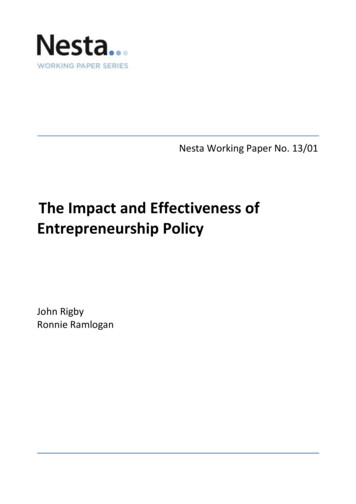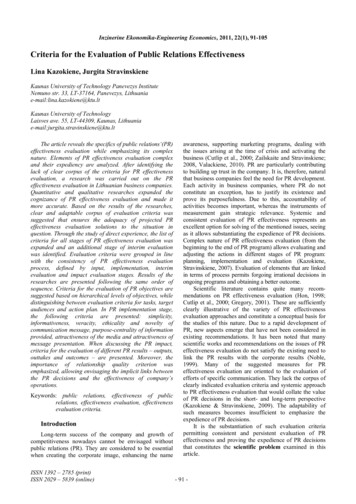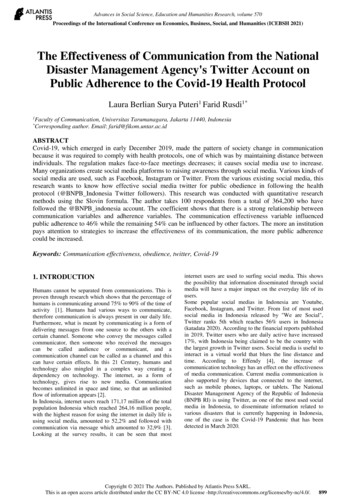
Transcription
Nesta Working Paper No. 13/01The Impact and Effectiveness ofEntrepreneurship PolicyJohn RigbyRonnie Ramlogan
The Impact and Effectiveness of Entrepreneurship PolicyJohn RigbyMIOIRRonnie RamloganMIOIRNesta Working Paper 13/01January 2013www.nesta.org.uk/wp13-01AbstractThis paper is part of the Compendium of Evidence on the Effectiveness of InnovationPolicy Intervention. This paper examines publicly supported policies for entrepreneurshipdevelopment. Entrepreneurship policies are directed to encouraging socially andeconomically productive activities by individuals acting independently in business. Theirprincipal objective is to increase a level of entrepreneurial activity which is considered tobe below the social optimum. Policies may be implemented directly to addressentrepreneurs’ needs e.g. business advice programmes or through broadcast methodssuch as education policy. We have attempted to locate and focus on evaluations thatreported on additionality / net effect or that use methods of causal inference todetermine the effectiveness and impacts of policy. While policies and programmes forentrepreneurship can be simplistically modelled as a series of inputs beginning withcultural change followed by general and then more specific skill development, it is hardnevertheless to assess impact or trace causality because of the difficulty of definingdiscrete units of input, the presence of confounding factors and the length of time overwhich effects can build.JEL Classification: O38Keywords: Entrepreneurship; policy; impactThe Compendium of Evidence on the Effectiveness of Innovation Policy Intervention Project is led by the ManchesterInstitute of Innovation Research (MIoIR), University of Manchester, and funded by Nesta, an independent charity withthe mission to make the UK more innovative. The compendium is organised around 20 innovation policy topicscategorised primarily according to their policy objectives. Currently, some of these reports are available. All reports areavailable at http://www.innovation-policy.org.uk. Also at this location is an online strategic intelligence tool with anextensive list of references that present evidence for the effectiveness of each particular innovation policy objective.Summaries and download links are provided for key references. These can also be reached by clicking in the references inthis document. Author: Dr Ronnie Ramlogan, Manchester Institute of Innovation Research, University of Manchester,Oxford Road, M13 9PL, Manchester, ronnie.ramlogan@mbs.ac.ukThe Nesta Working Paper Series is intended to make available early results of research undertaken or supported byNesta and its partners in order to elicit comments and suggestions for revisions and to encourage discussion and furtherdebate prior to publication (ISSN 2050-9820). 2013 by the author(s). Short sections of text, tables and figures may bereproduced without explicit permission provided that full credit is given to the source. The views expressed in thisworking paper are those of the author(s) and do not necessarily represent those of Nesta.
The Impact and Effectiveness of Entrepreneurship PolicyRamlogan and RigbyTable of ContentsList of Tables. 3Executive Summary . 41Introduction . 62Conceptual Background . 72.12.1.1The Entrepreneurial Nexus . 92.1.2Systematic Approaches . 92.234Entrepreneurialism: Characteristics . 7Entrepreneurialism: Policy Rationales . 102.2.1Introduction . 102.2.2Lack of Awareness. 102.2.3Information Problems . 102.2.4Access to Finance . 112.2.5The Positive Externalities of Investment in R&D and Innovation . 112.2.6When there is doubt over market failure: the case of incubators . 11Scope . 113.1Variety of Measures . 113.2The Selection Criteria of Financial Contribution . 123.3A Framework for the Presentation of Findings . 12Summary of findings. 124.1Classification of Schemes . 124.2Schemes to Promote Cultural and Behavioural Change . 134.3Schemes to Provide Information . 154.3.1Schemes to Provide Advice of a Standardized Form . 154.3.2Schemes to Provide More Specific and Situational Advice . 204.4Multi-Instrument Schemes . 244.4.1Schemes Combining Activities in Time. 244.4.2Schemes Combining Measures at a Location - Incubators . 285Lessons . 306References. 33Annex 1 List of Measures . 362Manchester Institute of Innovation Research
The Impact and Effectiveness of Entrepreneurship PolicyRamlogan and RigbyList of TablesTable 1 EIP Budget . 10Table 2 Coaching: UK Approach East Midlands Development Agency, 2005 . 22Table 3 Coaching and Mentoring and Consultancy: East Midlands Development Agency 2005 . 233Manchester Institute of Innovation Research
The Impact and Effectiveness of Entrepreneurship PolicyRamlogan and RigbyExecutive SummaryEntrepreneurial ability is widely regarded as key factor for success in business andconsequently innovation policy has been placing greater focus upon the entrepreneur, his skillsand values, a development that has been termed by some the entrepreneurial turn.This report examines publicly supported policies for entrepreneurship development.Entrepreneurship policies are directed to encouraging socially and economically productiveactivities by individuals acting independently in business. Their principal objective is toincrease a level of entrepreneurial activity which is considered to be below the social optimum.Policies may be implemented directly to address entrepreneurs’ needs e.g. business adviceprogrammes or through broadcast methods such as education policy.Entrepreneurship policy and SME policy both aim at causing two different kinds of effects in theeconomy. Both seek to improve the performance of economic actors (entrepreneurship policy isfocused on the key actors in the business, the entrepreneur, while SME policy seeks to increasethe competitiveness of the firm) and both seek to increase the number of economic actors,(entrepreneurship hoping to increase the level of supply of entrepreneurs, while SME policyhopes to increase the number of competitive firms).In regard then to these two areas for entrepreneurship policy, we have attempted to locate andfocus on evaluations that reported on additionality / net effect or that use methods of causalinference to determine the effectiveness and impacts of policy. Such studies tended to be foundin the academic literature rather than amongst the reports on the performance of governmentschemes (that are publicly available).We have examined the literature and it covers schemes that have been evaluated around adecade ago. Generally we find that recent policy initiatives in this area have not been evaluated.The policies and programmes that have emerged very recently have yet to be examined indetail.In regard to policies and programmes seeking to effect cultural and behavioural impacts, webelieve that the literature can teach a number of lessons. Programmes that seek to increaseawareness of entrepreneurship as a career choice can be seen within the area of educationpolicy. However the growing interest in entrepreneurial education has not been matched bysound evaluation evidence. Thus not only have the evaluations undertaken varied greatly, themajority of these studies appear limited in that they fail to include a pre-test post-test method,and few employ control groups or have a longitudinal dimension.The studies we have uncovered have attempted to address one or more of these concerns and tounderstand whether or not entrepreneurship education causes individuals to change theirintentions to become an entrepreneur. The effect of these schemes appears to be different atdifferent points in of the education system: at school level, there is a negative and significanteffect; at the college level the effect is low; at the university level, the effect is positive.The evaluations noted an important effect on intentions, what we call a sorting effect, by whichthose who may be unsure about whether they wish to follow an entrepreneurial path will havetheir minds made up for them, often resulting in a decision not to become an entrepreneur. Italmost goes without saying that these schemes which are aimed at cultural and behavioural4Manchester Institute of Innovation Research
The Impact and Effectiveness of Entrepreneurship PolicyRamlogan and Rigbychange are not designed in the short term to impact upon production or efficiency of economicenterprises.Schemes to provide information and advice of a standardized form are closest in form to thosewhich are addressed at the firm, rather than the entrepreneur. We note within our review twodifferent forms of support. There is a form of support providing advice and information to earlystage firms, and a form of support to nascent firms or pre-firms (pre start-up) where therecipient is the entrepreneur or would-be entrepreneur. Schemes of the former type areassessed by reference to the conventional economic impact categories, sales, employment andfirm survival. Schemes of the latter type are assessed by reference to the outcomes for therecipient of the support, usually employment status (unemployed, employed (as anentrepreneur)) and income.Schemes of the former type of scheme are more homogenous in what they provide, while thelatter kind is quite diverse and examples are difficult to compare one against another. Theformer type of scheme, of which the Business Link scheme and the Swedish Innovation Centreare examples, show mixed results. Overall, some schemes find positive impacts in terms of sales,employment and survival while in others impacts were statistically insignificant. The schemesoffering support to pre start-up entrepreneurs again varied in outcome. In the short term, allschemes increased employment; however, in the longer term, the US scheme, GATE for example,does not show persistence of employment effects at 5 years.More specific and situational advice schemes provision is a further sub-category of schemes thatseek to address the market failure for advice. The vast majority of programmes of this kind aretargeted at those who have elected to run their own business. However, we have foundexamples of schemes (Active Labour Market Policy Schemes) that target the unemployed - whatcould be called reluctant entrepreneurs. This scheme is really a combined scheme in that itprovides both general training and more specific advice for the “would be” entrepreneur. Suchschemes combine both general and specific help to the unemployed. Some minor impacts arenoted but the outcomes that have been observed are not a strong endorsement for this kind ofscheme.Coaching schemes are difficult to assess for impact. Those schemes providing assistance to newentrepreneurs running their own business are popular with those who receive the coaching butthere is a lack of studies that consider the counterfactual case. It is our belief that as more ofthese schemes are put into operation, and there is an expectation that they will be, moreevaluation will take place. This may reveal the factors that affect success. Incubators also areproblematic to assess as the evaluations of them deal with a great variety of schemes few ofwhich are comparable.While we have found a trend towards entrepreneurial support, we have found no studies thatfollow up explicitly on the contrast between specific help and more general or operationalsupport, in effect a comparison of two different forms of government assistance. It is a mootpoint therefore whether these schemes that do have different objectives should be subject tocomparison.5Manchester Institute of Innovation Research
The Impact and Effectiveness of Entrepreneurship Policy1Ramlogan and RigbyIntroductionEntrepreneurial ability is widely regarded as key factor for success in business. Theentrepreneur is the key mythic actor in the Schumpeterian account of the economic system andentrepreneurship is widely taught in business schools and within companies. Increasingly wesee entrepreneurship instruction offered in schools to young children, in general university andcollege courses and even more widely than that. Some writers have noted that innovation policyis moving its emphasis away from the support of SMEs towards the support of entrepreneurship(Henrekson and Stenkula, 2009), a development that Cox and Rigby have termed “theentrepreneurial turn” (Cox and Rigby, 2012).The study of initiatives to promote entrepreneurship generally raises interesting issues ofpublic policy that might be regarded as technical in scope, and these we aim to deal with atsome length in this paper where they are supported by a body of evidence from programme andpolicy evaluation. But we feel that we should note briefly a related and growing body of workcovering entrepreneurship policy that is achieving public prominence. Entrepreneurship policy,by virtue of being a policy closely associated with a class of social and economic actors, is alsoquite unmistakeably a political matter. Entrepreneurialism is political creed in a number ofcountries but no more so than in the United States where a number of writers have extolled theculture of the United States as being more suited to entrepreneurialism than any other. Inaddition to cultural and social explanations for the origins of and value of entrepreneurialismthere is a body of work emerging with the social and psychological sciences that investigatesand in a number of cases demonstrates a strong link between entrepreneurial behaviour andgenetics (Eckhardt et al., 2006; Nicolaou et al., 2008; Nicolaou and Shane, 2009; Nicolaou et al.,2009; Shane et al., 2010). Nevertheless, there are some who believe that entrepreneurshipcannot be taught, that the desire to be entrepreneurial cannot be inculcated because it is“genetic” and that public resources that are allocated to such a task are a waste of money(Shane, 2009). This research we mention but not investigate as policy and programmes have yetto respond to incorporate its insights. We should note however that the UK approach may bemaking the assumption1 - we call the “selectivity of entrepreneurship” - that the firms that willsucceed in becoming high growth are a minority, around 6% (NESTA, 2009a; NESTA, 2009c).This report therefore examines publicly supported policies for entrepreneurship development.The literature often and mistakenly equates entrepreneurship policy and SME policy but as anumber of authors (e.g. Storey, 2005) indicate, there is a substantive difference. Whereas SMEpolicies are directed to existing businesses or enterprises, and seek to provide advice andinformation to help with problems that are firm related (e.g. compliance with regulations,reporting requirements), entrepreneurship policies are directed towards individuals. These areindividuals who are either considering, are about to, may wish to consider, or have recentlystarted a new business.Entrepreneurship policies are therefore directed to encouraging socially and economicallyproductive activities by individuals acting independently in business (Henrekson and Stenkula,2009). Their principal objective is the increase the level of entrepreneurial activity which isconsidered to be below the social optimum. Policies may be implemented directly to addressentrepreneurs’ needs e.g. business advice programmes or through the broader macroeconomic16Based on work originally by Birch and reviewed, for the UK by NESTA (2009b).Manchester Institute of Innovation Research
The Impact and Effectiveness of Entrepreneurship PolicyRamlogan and Rigbypolicy frameworks e.g. education policy. Many innovation policies can have a spatial dimensionin that they may be provided in a particular location, for example, in a business incubator, in ascience park, in a cluster, or in a region. As entrepreneurship policies are focused on theentrepreneur, we have included a brief survey of incubators in our review because at thisspatial level, i.e. within incubators, support is generally provided to entrepreneurs and earlystages businesses, while at larger scales, the target of support is more likely to be the firm itselfrather than the entrepreneur. Our view here is that the incubator is not a distinct form ofbusiness support but a mainly locational principle for the delivery of specific activities2,including entrepreneurship skills, coaching, and access to other similar firms. Becauseincubators are highly diverse in the type and balance of the measures they provide, are differentalso in their location, and have the prospect of many interactions between their constituentactivities, the method of meta-analysis / systematic review cannot be realistically applied to acomparative study of the evaluations of incubators. Our review of reports on incubatorstherefore discusses the most recent literature on incubators and the important general themesemerging. Depending on the level of resource support, entrepreneurial policies can be classifiedas being hard or soft (Storey, 2005). Hard policies usually provide assistance in the form offinance (loans and grants) while soft measures include counselling activities to entrepreneursbefore business start-up, counselling at the start-up phase, facilitating financial assistance,enhancing technology and access to technology and improving access to physical infrastructure,or advice after the start.Entrepreneurship policy and SME policy both aim at causing two different kinds of effects in theeconomy. Both seek to improve the performance of economic actors (entrepreneurship policy isfocused on the key actors in the business, the entrepreneur, while SME policy seeks to increasethe competitiveness of the firm) and both seek to increase the number of economic actors,(entrepreneurship hoping to increase the level of supply of entrepreneurs, while SME policyhopes to increase the number of competitive firms).2Conceptual Background2.1 Entrepreneurialism: CharacteristicsThe literature sees entrepreneurship as comprising a range of personal characteristics, whichwe suggest can be considered to form two general categories: a) a value or attitude system ofcultural values; and b) a set of skills which we suggest are instrumental in the realization of avalue system. The value system is broadly a set of beliefs about ends, namely that the results ofentrepreneurship, wealth creation, personal interest, self-realization through business andcapital accumulation are the personal priority of an individual. Weber’s famous study 1905(Weber, 1905) is one of the best known but by no means the last to explore inter alia therelationship between belief systems and occupational success. By contrast, the entrepreneurialskill set comprises those aptitudes that give the entrepreneur the means of realizing the ends ofthe entrepreneur. The relation between ends and means is evidently problematic, given thecircularity in both directions in determining the meaning of the terms, viz. entrepreneurs are2Among the many sources of ambiguity in incubator research is debates about whether an incubator is adistinctive organisational form or a more general entrepreneurial environment and whether or notto include in any analysis virtual incubators that offer support business services to incubatees notco-located in the same physical space (incubator building) (Dee et al., 2012).7Manchester Institute of Innovation Research
The Impact and Effectiveness of Entrepreneurship PolicyRamlogan and Rigbypeople who have entrepreneurial skills on the one hand while entrepreneurial skills are thosepossessed by entrepreneurs on the other.Our view of a vast literature on the broad issue of what entrepreneurs do and how such a fieldshould be defined is that within the management and entrepreneurship literature onentrepreneurship there is a general agreement that entrepreneurship is concerned withinstrumental action and less with values and ends. This view is in our opinion founded on theAustrian view of human action best exemplified by the work of Von Mises where ends andvalues of human action are assumed subjective and “input” to the calculating faculty of humanrationality. How such rationality unfolds within markets and under conditions of scarcity is theAustrian orientation to the study of economics. It is not surprising therefore that thisframework for the study of economics places the entrepreneur centre stage, and no more sothan in the work of Schumpeter. This instrumental and action oriented approach underpinscurrent work on entrepreneurship. As Shane notes in the Academy of Management Review“entrepreneurship .[is]. the identification, evaluation and exploitation of opportunities”(Shane,2012: 12). Furthermore, as Shane and Venkataraman (2000), entrepreneurship is distinct fromthe study of the firm3 including firm formation, a distinction that is important for policy.While there is a strong assumption that entrepreneurship is therefore focused upon action,within the wider literature on entrepreneurship there is an awareness of and willingness to gobeyond the one-dimensional concept of entrepreneurship qua rationality towards richer modelsthat incorporate a variety of characteristics that affect entrepreneurial behaviour and itsoutcomes. Of note for policy makers and designers of support for entrepreneurship is a trulyvast range of work on entrepreneurial characteristics, what might be called dimensions toentrepreneurial behaviour, and the link outcomes of many kinds, and some degree, a focus uponlearning by experience and that, to paraphrase Goethe4, to achieve success as an entrepreneur,knowing is not enough, one must apply one’s knowledge and experience the role by performingit.We have reviewed some of this work and believe that a number of contributions are helpful inunderstanding where scope for policy action may exist: on entrepreneurial orientation (EO)(Dess et al., 2011); goal seeking by entrepreneurs (Ardichvili et al., 2003), the social contexts ofentrepreneurship, and broader links to labour, taxation and other polices (Henrekson andStenkula, 2009); on skills development, the OECD review (OECD, 2010) provides a frameworkthat argues for a unique set of (convergent) skills that involve analysing and making use of andadapting new information to combine with existing information: “Entrepreneurship specificskills for creating and running new business ventures and innovative projects in existing firms,such as risk assessment and warranting, strategic thinking, self-confidence, the ability to makethe best of personal networks, motivating others to achieve a common goal, co-operation forsuccess, and the ability to deal with other challenges and requirements met by entrepreneurs”(OECD, 2010: 166).The study of entrepreneurialism thus conceived denotes a field with unique characteristics – aknowledge domain to be studied in its own right with its own methods.4 Wilhelm Meister's Journeyman Years.38Manchester Institute of Innovation Research
The Impact and Effectiveness of Entrepreneurship Policy2.1.1Ramlogan and RigbyThe Entrepreneurial NexusWhile a large body of core of research centres on the entrepreneur as a key economic actortherefore, there has been a tendency for research to work outward from the entrepreneur toconsider other factors and policies, what might be termed the supporting cast of policies whichassist entrepreneurs achieve their various objectives. These related policies involve suchactivities as the provision of finance for entrepreneurship, and advice and financial assistancefor the firm. They may also include to some extent policies that provide these forms of supportin a bundle in either time or space (for example, incubators) or both. The attempt to designateareas of action as relevant has been extensively widened and, in some cases, the argument forsupport to entrepreneurship takes on the form of lobbying for action by government are verybroad in scope (Kauffman Foundation, 2012). The next section of this report examines howpolicy makers justify their policies on entrepreneurship and shows where currently, the limitsof action lie.2.1.2Systematic ApproachesEntrepreneurship policy while having its own specific rationales can also be considered withinthe context of broader policies to promote economic growth, development and sustainability.The European Union, for example, has sought to develop its framework for entrepreneurshippolicy across multi-country context and within a single programme, the Entrepreneurship andInnovation Programme (EIP), consisting of six streams of activity (see Figure 3). This requiressystematic policy coordination at all levels and between all levels. The EIP is an umbrella projectin effect - to promote entrepreneurship that covers financial assistance to firms, promoting theEnterprise Europe network, and supporting eco-innovation. The programme is important as aform of support to entrepreneurship because of the scale of funding, although of course theamount of money is to be spent across the whole of Europe. Example of activities (parts E and Ffor instance) directed at promoting entrepreneurship include: a) the Community programmefor the reduction of administrative costs; b) IPR Helpdesks (European Helpdesk on IPR andChina SMEs Helpdesk); c) E-skills (study; conferences; seminars; best practice exchange); d)European SME week/ European Charter for Small Enterprises: (conferences; workshopsdissemination of good practice and information); e) Information campaign on CE marking; andf) SME performance review (studies; workshops; meetings).A recent evaluation of the programme (Centre for Strategy and Evaluation Services, 2011)examined its relevance, efficiency and effectiveness. However, the real impacts of theprogramme in terms of the growth of enterprises, generation of employment and contributionto welfare were not able to be assessed as, at the time of evaluation, the programme was stilltwo and a half years from completion. Nevertheless, the review, largely based on a survey andmonitoring with high profile interviews about what the participants and beneficiaries believedwere useful, came to a number of conclusions on operational performance and early andintermediate inputs, including the following: 9That the programme was particularly effective at the Europe wide level in addressingthe needs, problems and issues (points A-F, diagram 2) set out;That the overall objectives were coherent and the implementation processes wereintegrated measures implemented by member states;That it was on track to achieve the anticipated impacts expected of it; a
Table 2 Coaching: UK Approach East Midlands Development Agency, 2005. 22 Table 3 Coaching and Mentoring and Consultancy: East Midlands Development Agency 2005 . 23. The Impact and Effectiveness of Entrepreneurship Policy Ramlogan and Rigby . college courses and even more widely than that. Some writers have noted that innovation policy











